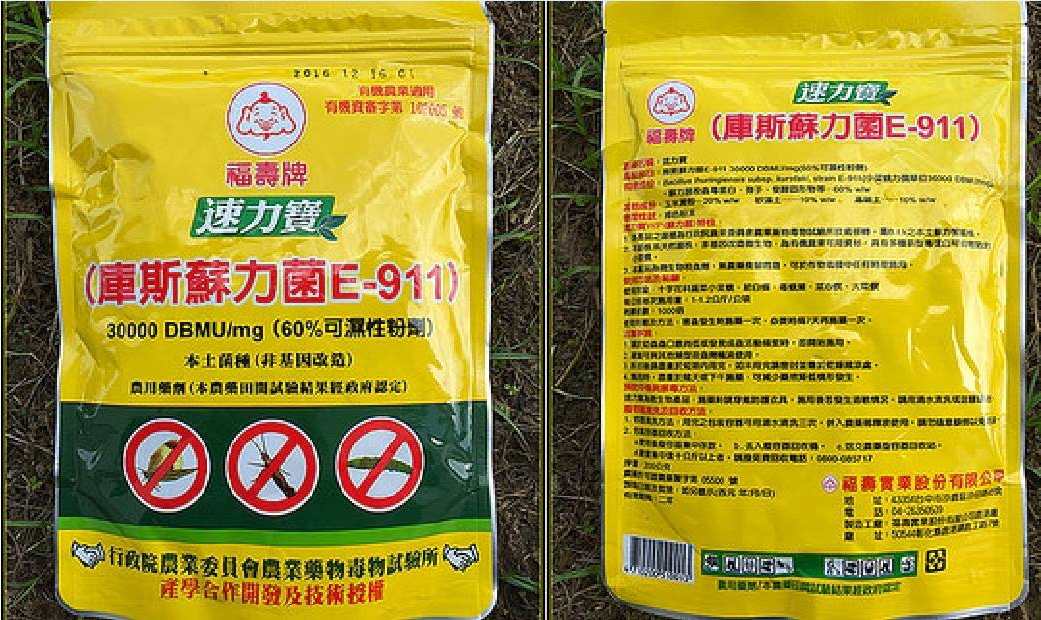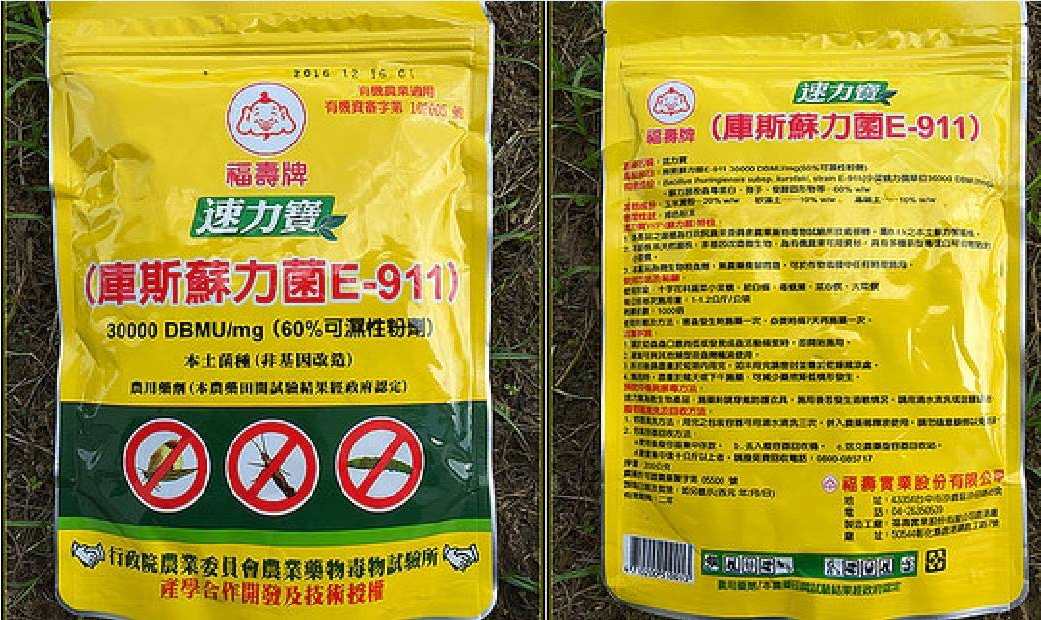Organic thurian Suilibao detected "diphenylamine" investigation: lubricating oil accidentally entered the production process
Share267 +1 Tweet EmailShares 267
The chemical agent "diphenylamine" 0.19ppm was detected in the product "Sullibao", which did not meet the requirements of organic materials. The latest investigation results released by the Institute of Drug Poison today (13) point to the source of diphenylamine pollution in the process. It is believed that the lubricating oil mixed with diphenylamine in the pumping equipment has not been filtered thoroughly and accidentally enters the process. It is suggested that Fushou should improve the pipeline and replace the filter as soon as possible, and adjust the product before applying for organic material registration again.
In this regard, Fushou Industrial said that there was no deliberate addition of diphenylamine, and it would be further confirmed whether it was a pollution problem in the process, but in order to be cautious, the "Sulibao" manufactured after August 6, 107 (batch number 2018.08.06) had been fully recovered, and it was also emphasized that "Sulibao" should be diluted by 1000 times with water before use, and it was still safe for use in the field.
No diphenylamine was found in other Sullibacterium and early Sullibao products on the market
Pesticides are mainly divided into chemical pesticides and biological pesticides. Biological pesticides are lower in residual risk and environmental pollution risk than chemical pesticides. They are considered as relatively friendly pesticide materials. Sullibacteria are safe, nontoxic and free of pesticide residues. They are commonly used biological pesticides by organic farmers. Fushou "Sulibao" is the first native Bacillus thuringiensis biological pesticide in China, and it is also the only Bacillus thuringiensis product that has passed the organic certification. This time, the chemical agent "diphenylamine" was detected, which made organic farmers panic and caused doubts about biological pesticides.
In an interview last week, Fei Wenqi, director of the Institute of Pharmacy and Poison, said that most of the strains of Thulea products currently on the market come from abroad, and after importing raw materials, they are manufactured in Taiwan, while only Fushou has a local production strain, and this strain (Thulea E-911) was transferred to Fushou by the Institute of Pharmacy and Poison in 1996. The purpose of the material is insect repellent and pest control. The manufacturer has no reason to add diphenylamine, and no manufacturer has registered the use of diphenylamine in China. Why does it need to be investigated?
Last week, the Institute of Drug Poison started the sampling test of Bacillus thuringiensis products, and the test results were released today (13). Fei said that after sampling other Bacillus thuringiensis products on the market and Fushou's early "Sulibao" products,"no diphenylamine was found", so the possibility that the strain would automatically produce diphenylamine biological characteristics was ruled out.
Investigation by the Drug Poison Institute: Alkylated diphenylamine was detected in lubricating oil, and the filtration process was inadvertently contaminated.
On the other hand, biological pesticides require special equipment in production, and if they are mixed with chemicals, most of them are pipeline pollution problems. 30% of diphenylamine is used for preservation purposes, and the remaining 70% is used as lubricants. Therefore, the Drug Poison Institute also further sampled the lubricating oil in Fushou's equipment and pipelines. Finally, alkylated diphenylamine was detected in the lubricating oil. It is inferred that the filter is in a condition and has not been filtered thoroughly, so the lubricating oil components accidentally entered the process."When the bacteria are fermented, they need to pump up the equipment, and the pipelines will be smeared with lubricants. It is possible that Fushou did not properly filter the filter, and the diphenylamine will enter the product. It can be considered contaminated in the manufacturing process." Fei Wenqi explained.
She also pointed out that there is no diphenylamine standard agent in China at present, and it will take more than half a month to buy it from abroad. Therefore, this time, the drug poison institute cannot measure the quantity (i.e. the content number of the substance), but only the qualitative one (i.e. the presence or absence of the substance). The problematic "Sulibao" products were produced after 104 years."There was no problem with the 'Sulibao' products from 100 to 103 years. Diphenylamine was only detected in the products of 104 and 107 years. The products of other years were not detected because there was no sample." She suggested that Fushou should improve the pipeline and replace the filter as soon as possible, adjust the product and then re-apply for organic material registration.
Fushou: The process will be further confirmed, and there is something wrong with agricultural materials detected by food pesticide residue standards.
Cai Jiaguang, vice president of Fushou Industry, said that last week, each batch of raw materials and ingredients in "Sulibao" were tested one by one, and no chemicals were detected. In the face of the drug poison institute will lead diphenylamine source to the lubricating oil on the air compressor, he responded: "We still need to further confirm the relevant errors in the process, confirm the cause, will take responsibility." It was emphasized that diphenylamine was never intentionally added.
For the accident product, he said that he had contacted the domestic distributor last week to fully recover the "Sulibao" manufactured after August 6, 107 (batch number 2018.08.06), and the semi-finished products still in the warehouse would not be sold again."The organic material license batch number will not be used until the cause is found and the product is improved."
Cai Jiaguang bluntly said that agricultural materials are mainly used in the process of crop cultivation, not for direct consumption. He believed that it is inappropriate for the competent authorities to detect agricultural materials with 374 pesticide residue specifications for food inspection, and only "Sulibao" is registered as organic materials for the current market."It is inevitable that they will be enlarged for inspection, and those that are not registered (as organic materials) will not be managed." He also stressed that "Speed Power" should be diluted 1000 times with water before use, and it is still safe to use.


Fushou "Sulibao" is the first native Bacillus thuringiensis biological pesticide in China. It is a common biological pesticide for organic farmers. (Photo provided/FAO)
Drug Poison Institute: Sulibao is still a qualified biological pesticide material, which can be used by non-organic farmers.
Wei Wenqi explained that in the annual sampling operation, biological pesticide products will not be tested for chemical pesticides, only the registered biological species and the price (that is, the effectiveness of pest control) will be tested. Fushou "Sulibao" was detected this time by the chemical agent "diphenylamine" 0.19 ppm (ppm is one part per million units), because it does not meet the requirements of "no chemical agent can be detected" in organic materials, there are doubts about violation. "Different biopesticides have different allowable chemical concentrations, but generally, residue concentrations below 1/1,000 are negligible." Therefore,"Sulibao" is still a qualified biological pesticide material, and non-organic farmers have no doubts about its use.
The only organic material in China, Sullibacterium "Fushou Sulibao", detected chemical pesticide diphenylamine, the reason to be investigated
Share267 +1 Tweet EmailShares 267
- Prev

All-day Logistics Taitung Station opens County Mayor Huang Jianting to assist in the sale of agricultural, fishery and livestock products
In order to integrate the island-wide cold chain and support the sales of local agricultural products in Taitung, the National Cold Chain Logistics Factory-All Day Logistics Co., Ltd. participated in the Taitung County Government's investment in the construction of Taitung Logistics Transfer Station. Yesterday (11), the opening ceremony was held. Taitung County...
- Next

The grand debut of Taipei International Entrepreneurship week 2018! Xingguang Media Association opens up business opportunities
Taipei is the entrepreneurial capital of Taiwan, bringing together top domestic industry, economy, talent and other top resources, and the atmosphere of innovation and entrepreneurship is lively. In order to show Taipei's vibrant entrepreneurial style and help outstanding innovative teams jump onto the international stage, Taipei products.
Related
- A course of planting techniques and methods on how to grow carrots
- How to plant the latest tulips?
- Is it better to pick tea in the morning or in the afternoon? When is the best time for tea to be picked? what is the third or fifth tea?
- Launch Yuanxiao Happy combination Haocha + Tea Yuan healthy Taste
- Penghu Tourism "Fireworks 20 Parade with You"
- 2022 West Lake Happiness holds "Digital Revitalization Voucher" and draws iphone13 and laptop.
- Banqiao Fuzhou social houses are designed to change start-up combined with police elimination to create a safe and livable environment
- The convenient measure of "mechanical weeding" in Xinbei has been abused and the Agriculture Bureau has imposed heavy penalties on the illegal land consolidation.
- Changgeng University Joins Hands with Four Memory Factories to Rescue Memory Talent Shortage
- The list of Taiwan's top 100 MVP managers is listed by the Director-General of the Farmers' Association of Sanxia District.

